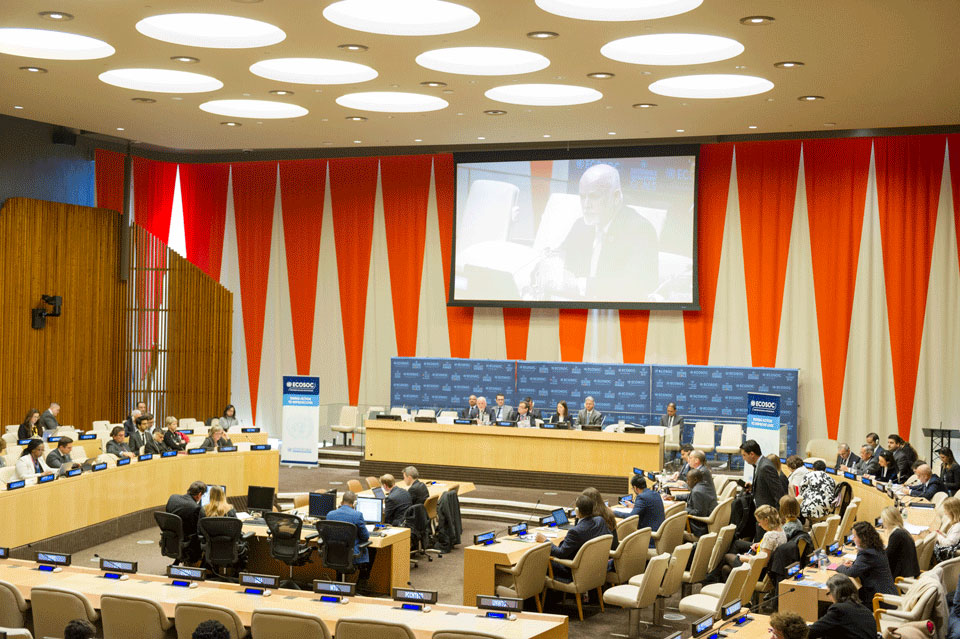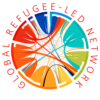
The United Nations Economic and Social Council (ECOSOC) established the Executive Committee (ExCom) of the United Nations Refugee Agency (UNHCR) in 1958. Even though ExCom was established by ECOSOC, it functions as a subsidiary organ of the General Assembly. ExCom is the decision-making body for UNHCR, and it holds one annual plenary session, usually in early October. The Standing Committee of ExCom meets three times a year and works on issues raised in the plenary throughout the year.
- To advise the High Commissioner in the exercise of his/her functions;
- To review funds and programmes;
- To authorize the High Commissioner to make appeals for funds;
- To approve proposed biennial budget targets.
Currently, only UN Member States can be members of ExCom. However, representatives of NGOs which have been granted consultative status by ECOSOC can participate as observers to ExCom meetings. Currently, one such organization is ICVA, which coordinates the development of the joint NGO statements delivered at ExCom and Standing Committee meetings.
For many years, the Global Refugee-led Network has advocated for refugee representation at ExCom. One way of achieving this goal is applying for ECOSOC status to participate in ExCom meetings as an observer, as ICVA does. In this role, the GRN would serve as a coordinator for RLOs and prepare a joint statement in their name to read at ExCom.
This statement was drafted through ongoing consultations with a wide variety of refugee actors globally and attempts to reflect the diversity of our views.
Year after year, the number of people in need of international protection continues to grow—UNHCR currently cites the total number of refugees and asylum seekers at nearly 32 million people, with over 89 million people forcibly displaced. With increased migration due to non-traditional situations, such as climate change, forced migratory flows will only become more complex. This reality is only made worse by gaps in international protection—gaps that refugee leaders can identify and address if properly consulted and resourced. We therefore identify four main areas of focus for UNHCR, ExCom members, and other stakeholders to prioritize over the coming year.
First, protection must apply indiscriminately to all people fleeing displacement, and should be tailored to address the specific needs of vulnerable communities. For example, while the extension of the Temporary Protection Directive (TPD) to Ukrainians fleeing Russian insurgence was a promising step towards successfully implementing the burden-sharing schemes European countries have designed, but infrequently used, it also highlighted great disparities in treatment towards different refugee groups. Many reports of discrimination towards people of colour, also fleeing the war in Ukraine, surfaced at European borders. At the same time, pushbacks occurred at southern European borders, and European policy and funding to offshoring refugees and migrants outside of the European Union continued. International Protection is not a principle to be applied when convenient; it is a human right guaranteed to all people who are forced to flee and must be implemented as such.
In addition, protection must take into account the needs of particularly vulnerable groups, including (but not limited to) women, children, people with disabilities, and the LGBTQI+ community. To do so, Member States and international organizations must ensure an Age, Gender, and Diversity Mainstreaming (AGDM) approach to refugee inclusion. Specifically, this means that political bodies integrate age, gender and diversity considerations into all actions around refugee policy. This entails not only ensuring a diversity of voices at the decision-making table, but also tailoring policy, such as prioritizing resettlement of women and girls and communities of people with disabilities, or improving policies on refugee determination based on sexual orientation, gender identity, and sex characteristics—currently, the Global Compact on Refugees does not even mention LGBTQI+ refugees. To achieve these objectives, international actors must meaningfully include the perspective of organizations that work closely on these issues: refugee-led organizations (RLOs) working at the local level, organizations/institutions led by women, and faith-based organizations, among others.
Protection must also apply to vulnerable forcibly displaced communities that are often overlooked, like journalists and people who lack legal identity and identification. Currently, 1 billion people around the world have no passport or formal identification. This is a major challenge for people who are forcibly displaced, as they often have no identification from their country of origin, and if they do have it, they are not able to renew these documents in their host country. This reality creates a serious vulnerability for people on the move, as people without, or with expired identification are not entitled to access basic human rights, including access to social services, healthcare, education, shelter, etc. This is an issue for Venezuelans, who often cannot afford renewing or obtaining a passport abroad, due to prohibitive costs. In addition, children of Venezuelan parents who are born where there is no jus soli (right to nationality in the country of birth) struggle to visit the Venezuelan consulate to register the birth of their child, leaving the children de facto stateless. One way to address this issue is to enable identification documents to be accessed digitally. Specifically, the international community must call on the United Nations Task Force on Digital Identity to work with the forcibly displaced community to address this issue.
Second, gaps between protection policy and practice must be identified and closed through the increased localization of aid and resettlement practices. For example, refugees’ right to work is enshrined in the 1951 Refugee Convention, multiple bodies of international law, Sustainable Development Goal #8, and national policies in Uganda. Nevertheless, the refugee community in Uganda struggles to actually activate this right, due to the difficulty of obtaining a passport, and, by extension, a work permit. The Africa Network of Refugees has spearheaded research and advocacy to address this issue. Similarly, while the Latin American region has some of the most progressive policies towards refugees on paper, countries in the region struggle to implement them in practice. In Europe, refugees face other practical gaps in accessing their rights. For example, refugees want to be able to seek work across the European Union, a right that is enjoyed by other EU citizens. For this reason, RLOs and initiatives in the region have led efforts to analyse and publicize the difference between rhetoric and reality. In all of these cases, however, the in-depth work done by RLOs at a local and regional level has largely failed to make it to the international stage. States and large international organizations must actively seek out refugee and local organizations in order to learn how the implementation of policy is being hindered on the ground, and how to fix this when it happens. These efforts should include creating a mandate to partner with local refugee organizations as a precondition for any refugee policy response and updating and signing pledges to include localized responses. When these gaps between the policy and practiced are fixed, refugees are able to effectively integrate into their host communities, bolster their local economies, and often serve as the new point of contact for newer arrivals, relieving the burden from host governments and international agencies and organizations.
Third, durable solutions for protection issues must be advanced through the inclusion of refugees in peace building and conflict resolution processes. This includes not only including refugee advocates who have already been active around these processes, but running information and capacity-building campaigns to all refugees from the conflict, especially those who live in rural areas and have less access to internet, and therefore information, resources and knowledge. In order for peace processes to be successful, they need to be representative and owned by the community; including refugees in these process increases the likelihood of finding a durable solution. The necessity of refugee involvement should be codified in the text of any peace agreement, such as the R-ARCSS in South Sudan, which states that parties and stakeholders must ensure adequate dissemination of the peace deal to “South Sudanese people inside the country, in different cities and refugee camps in neighbouring countries, and in the diaspora, so that the people can understand, support, and own it.”
Finally, as the backbone to all of these recommendations, refugees must be meaningfully included in all levels of decision-making about refugees. This call is not new; from Georgia, to Colombia, to Australia, to Lebanon, refugees themselves are proving life-saving support to forcibly displaced communities, supporting resettlement, integration, education, livelihoods, and self-reliance efforts. Nevertheless, while significant strides towards meaningful refugee participation have happened over the past few years, the international protection system is still punctured by gaping holes. For example, as the governing body of UNHCR, ExCom’s importance cannot be understated to international refugee policy. Yet there is no contribution to its processes from any of the people actually affected by its policies—refugees. We call on the Executive Committee to adopt a new rule to enable more refugees and affected populations to consult with the Committee, as observers.
Over the next year, members of the Executive Committee must commit to ensuring (i) refugees are represented in decision-making forums at local, regional, and international levels; (ii) all refugees and affected communities are able to meaningfully participate in all stages of the refugee response; (iii) RLOs are sustainably funded with quality funding for institutional strengthening.
We urge the international community to ensure these recommendations are implemented in accordance with goal 6 of the Grand Bargain, to support a “Participation Revolution,” in order to increase accountability to affected populations around the world.
To conclude, we would like to express our appreciation for the Executive Committee’s service to those who, like us, were forced to flee, and we affirm our commitment to collaborative engagement.
NOTE: A refugee is understood as a person who has been forcibly displaced from their home country, regardless of obtaining any legal status. Refugee-led organizations/initiatives are organizations which are founded and/or led by those with lived refugee experience, and may include both formal, registered organizations and informal initiatives.

